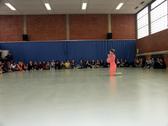On February the 6th 2004, a German practitioner from Hamburg successfully passed a sports examination at university. The course concluded with a dancing test at the end of the semester. In one part of the exam, more than 30 students had to perform a three-minute dance they created that semester, accompanied by a song of their choice. The song this practitioner picked was “Free Xiong Wei.” She wanted to let people know about her Chinese friend’s situation. Though Xiong Wei was released on January the 5th after being persecuted in a Chinese labour camp because she practises Falun Gong, she hasn’t escaped the danger. As long as she is in China, she is still on the brink of being persecuted.
To all the students, teachers and examiners, this exam was very important because they had spent so much time and energy preparing for it. Many people came to watch the performances, including those who had taken the tests in the past, teachers and students from other subjects, and students’ relatives and friends. The air was filled with the atmosphere of nervousness, anticipation and excitement.
There was a large audience watching the dance test. More than one hundred people were seated around the hall in the gymnasium. Since the doors were left open, the music kept attracting more people.
Because this practitioner had talked about the persecution of Falun Gong to many of her classmates and teachers, they all supported Falun Gong. She was permitted to briefly introduce Xiong Wei and the persecution of Falun Gong in China to examiners before she started to perform the dance, which usually would not be allowed. Holding a banner with Xiong Wei’s photo, she told them that Xiong Wei once studied in the Technical University in Berlin. After returning to China, she worked with a German company. She was arrested in China because she distributed leaflets about the persecution of Falun Gong, and was then imprisoned in Xinan Forced Labour Camp in Beijing. After countless appeals by Falun Gong practitioners, human rights organisations, and politicians, Xiong Wei was released last January, but could still be under surveillance at present.
The German student’s presentation and dancing moved many of the audience members to tears. Her singing voice resounded in the huge arena, while the atmosphere was quiet. When she presented the persecution Xiong Wei had suffered in her dance, the audience watched attentively.
After the exam finished, many of the audience members expressed their support and deep sympathy to her. Some music-CDs created by practitioners and newspapers introducing this illegal persecution were placed on a desk. They were taken by the audience quickly. Many people inquired about the song, saying that they were moved by the words of the song and felt it was beautiful. One student who bought the CD said that he didn’t believe a person with a belief could have such a huge influence. After the exam, she played the CD at home and told her mother about Xiong Wei’s story and the dance performance; her mother burst into tears.
Another student said that after returning home, she also listened to the CD and read the lyrics. After knowing that practitioner Wang Lixuan and her eight-month-old baby were persecuted to death, she was in tears while listening to the music. She felt that the things happening in China are too cruel.
 |  |
 |
It was surprising that the examiners graded the students’ performance right after they all completed their first round, because usually it would be graded only after the completion of second round of all performances. After a brief discussion, the students decided to dance a second round performance. This was very good because there were some newcomers entering the hall, and they also had a chance to learn the facts about the persecution.
After announcing the results, a Professor mentioned that because the performance of “Release Xiong Wei” moved the examiners’ hearts, they hoped that Xiong Wei will be rescued from China and have a bright future; the examination panel awarded this dance first place for excellence and artistic merit.
* * *
You are welcome to print and circulate all articles published on Clearharmony and their content, but please quote the source.










 more ...
more ...